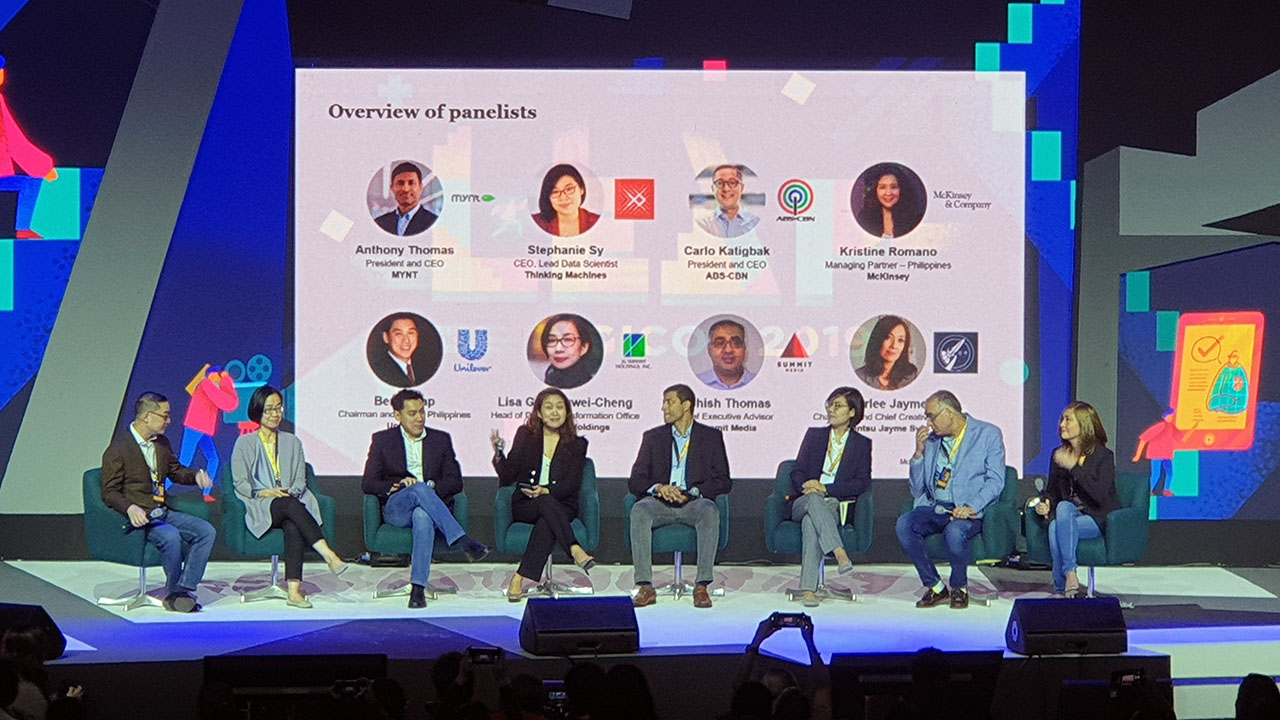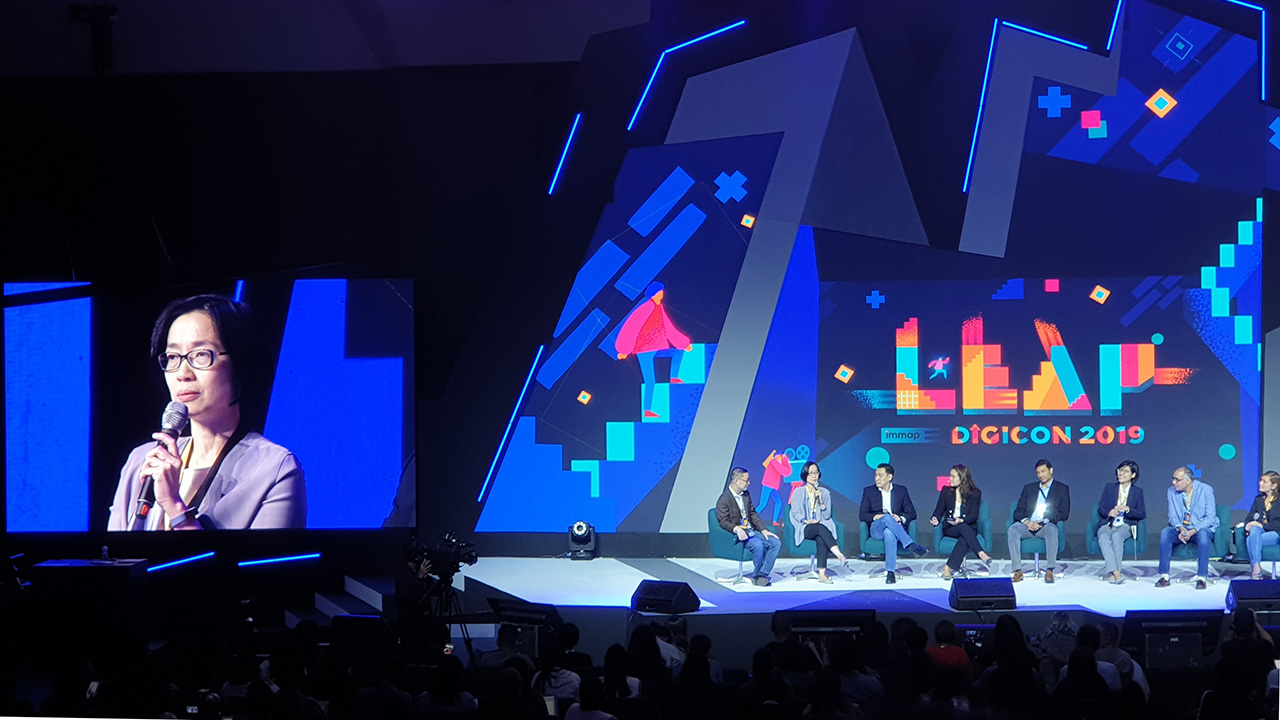Billed as the largest gathering of the digital industry in the Philippines, DigiCon 2019 took place from October 16 to 18, 2019, at the PICC. Organized by the Internet and Mobile Marketing Association of the Philippines, the conference sought to provide an in-depth look at industry best practices and technologies driving the world’s most successful companies and brands today. Now on its fourth edition, the conference focused on its “LEAP” theme: Lead, Explore, Apply, and Practice.
More than 75 industry leaders took part in talks, interactive workshops, and panel discussions over the course of DigiCon 2019. On the conference’s third day, a panel composed of executives from various industries gave their perspective on how digital is affecting their organizations and the critical role that marketing continues to play even as the commerce landscape changes. On the panel were Lisa Gokongwei-Cheng, president and CEO of Summit Media and head of JG Summit Holdings’ Digital Transformation Office; Ashish Thomas, chief executive advisor of Summit Media; Carlo Katigbak, president and CEO of ABS-CBN; Benjie Yap, chairman and CEO of Unilever Philippines; Anthony Thomas, president and CEO of Mynt; Stephanie Sy, CEO and Data Scientist of Thinking Machines; and Merlee Jayme, “chairmom” and CEO of creative agency Dentsu Jayme Syfu. Kristine Romano, managing partner of global consulting firm McKinsey & Company, served as the panel moderator.

Carlo Katigbak, president and CEO of ABS-CBN; Lisa Gokongwei-Cheng, president and CEO of Summit Media and head of JG Summit Holdings’ Digital Transformation Office; Benjie Yap, chairman and CEO of Unilever in the Philippines; Kristine Romano, managing partner of McKinsey Philippines; Anthony Thomas, president and CEO of Mynt; Stephanie Sy, CEO and Data Scientist of Thinking Machines; Ashish Thomas, chief executive adviser of Summit Media; and Merlee Jayme, “chairmom” and CEO of Dentsu Jayme Syfu.
Before the discussions got underway, Romano shared some interesting digital insights gleaned from McKinsey’s research. In a survey of 100 executives in the Philippines, 90% shared that their companies have already started to embark on their digital transformation. In terms of e-commerce, their research points to an expected 19% growth in the next three to five years. While for customer intelligence, 90% of South East Asian consumers are willing to share their personal data with banks if it means getting customized offerings in return—in stark contrast to consumer behavior in Western countries. The last nugget on customer behavior was that Filipinos spend around 10 hours a day on the internet or on their mobile phones—one of the highest usage rates in the world.
A DIFFERENT WAY OF DOING THINGS
Speaking on the first point, which involved digital transformation, Lisa Gokongwei-Cheng put it into perspective. “The Chinese word for crisis and opportunity are the same,” she began. “And I think this is how JG Summit, when Lance [Gokongwei] became our CEO, decided that digital transformation should be an opportunity rather than a threat, and he decided that it should be an enabler of our ambition. So, the way we approach it is really as an opportunity.”
The company’s digital transformation will rely on three pillars, according to Gokongwei-Cheng. “The first is digital technology, digital models. All these things are very disruptive, but they can also be used for digitizing or for making things in your in your business efficient, the way we reach audiences is more effective through digital marketing. You can definitely make things more efficient even in operations. So that's one opportunity.”
Gathering and correctly analyzing consumer data form the second pillar. As a large conglomerate with several businesses—banking, real estate, airline operations, and consumer media among others—JG Summit sits on a treasure trove of acquired customer data. “How do you then harness this data? How do you reach your audiences better? How do you know your audiences more, and also how do you build on this data? What other businesses can you build upon this data?” According to Gokongwei-Cheng, all these questions will play a part in JG Summit’s strategy to better serve the customer.

And finally, the head of JG Summit’s Digital Transformation Office revealed, “The third pillar of the strategy is startups. I mean, people always say conglomerates like JG Summit are going to be too slow. That we are very powerful, but we are very slow. So one way of approaching that is to participate in the upside of the startup world. You invest in them, so you participate in the upside and you also learn how they work.
“Through these three pillars, we feel we are at the start of our digital transformation.”
THE CUSTOMER IS KING
The panel then turned their attention to the commerce side. Speaking about the digital transformation at Summit Media, an affiliate of JG Summit Holdings, Ashish Thomas told the audience, “We were one of the first to recognize the disruption many years ago.” He explained that the company took the bold step to shut down the traditional part of the magazine business, which was print, and went completely digital. “I think we are not getting disrupted; we are driving the disruption. And that’s how we are approaching it.”
Asked about the best way to win over the digital customer, Thomas said, “One of the things we are doing very aggressively is educating our market.”
He added, “The average C and D consumer gets only two square meals a day… they would rather buy load for access. That hunger for access and being connected digitally is so high, that someone would go against the physical need of fulfilling their hunger.”
According to Thomas, 60% of users in that category give up one meal a day because they want to be online. With that in mind, Summit Media strives to provide content that is important to the consumer. “We are the closest to them because we are serving their needs for information, for content, for entertainment, for lifestyle, for life-saving tips. That’s something we are doing very well at present.”
THE MILLION DOLLAR QUESTION
A hypothetical question brought the panel to a close. Involving digital marketing, what would the panelists do if they had a million dollars to spend? For Gokongwei-Cheng, that would involve hiring the “complete” employee or team: “They have to be a generalist, at least. They have to know all the tools—they have to know SEO, they have to know performance, they have to know social media, CRM, and whatever else is out there, e-commerce. But I am looking more for someone who is culturally a digital person, and this is the ‘growth hacker’ mentality. They have to be agile in their mindset, which means they have to be able to work in an organization with different people, not only marketing people. They have to be data-centric. They don't necessarily have to be the data scientist, but they have to be comfortable with data and have to be able to ask the right questions.”
Aside from having these skills, their attitude is also important, says Gokongwei-Cheng. “They still need to be customer-centric, and they have to be as comfortable with branding and understanding the customer journey. Because in the end, it's really about the pain points of the customer. If you are able to address that, then everything else will follow.”


